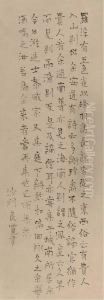Ryokan Taigu Paintings
Ryokan Taigu, also known simply as Ryokan, was a Japanese Zen Buddhist monk and poet who lived during the late Edo period. He is renowned for his poetry, calligraphy, and for embodying the Zen ideal of simplicity and humility.
Born in 1758 in the Echigo Province (present-day Niigata Prefecture), Ryokan was originally named Yoshiaki. He was the youngest of seven children in a family of village headmen. At the age of 18, disillusioned with the prospect of a secular life and inspired by the serenity of a passing monk, he left home to enter monastic life.
Ryokan received his monastic training at the monastery of Entsu-ji under the guidance of Kokusen Roshi. After a period of intense Zen practice, he was ordained as a Soto Zen monk and given the Dharma name Taigu, which means 'Great Fool', a name that reflected his unpretentious and simple nature.
Despite his training, Ryokan chose not to take a position at a temple but instead lived as a hermit for most of his life. He spent his time in quiet contemplation, writing poetry, and calligraphy, often exchanging poems with his contemporaries. Ryokan lived a life of poverty by choice, begging for food, and often giving away what little he had to others more in need.
His poems are characterized by their simplicity, charm, and lack of pretension. These works often depict the beauty of nature, the joys and sorrows of life, and his own playful spirit. Ryokan's poetry and calligraphy were not widely known during his lifetime, but after his death, he has become one of the most beloved figures in Japanese literature, with his work influencing many poets and writers.
Ryokan passed away in 1831. Although he led a solitary life, his legacy continues through his art, which captures the essence of Zen Buddhism and the spirit of his hermit lifestyle. Ryokan remains a cultural icon in Japan, symbolizing the beauty of a life lived in simplicity and harmony with nature.
